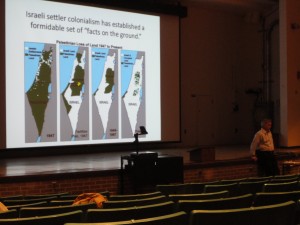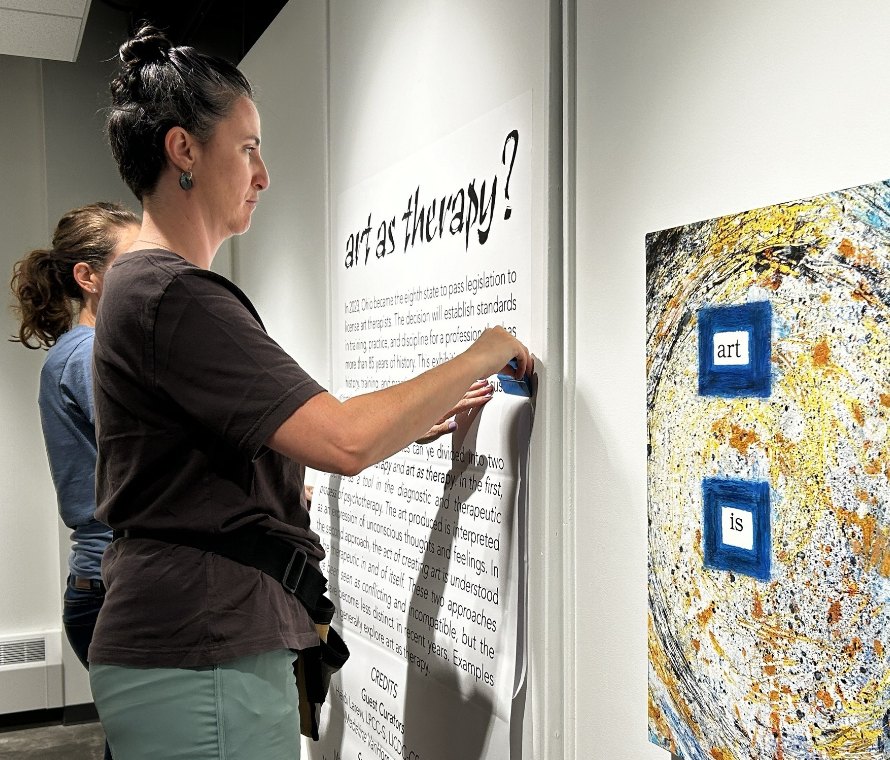Written by: Katelyn Freil
While students and teachers may have gone on trips to the beach, an island, or even Europe this summer, UA history professor Walter Hixson went to the Middle East.
In Leigh Hall last Tuesday, Hixson gave what he called a “teach-in” titled “People and Places of the Israel-Palestine Conflict.”
“I went this July to Israel and the occupied Palestinian territories, and also spent three days in Lebanon,” Hixson said. “I found it extremely interesting and educational.”
The talk focused on conflict in the Middle East and his experiences over his visit.
“It’s an issue I’ve been interested in for a long time,” said Hixson, who is a historian in U.S. foreign policy. “Israel is a very close ally of the United States, and so I have been more and more interested in this conflict.”
Hixson said that he looked for a group to go with to the area and found Interfaith Peace Builders. According to Hixson, this is a nongovernmental organization that takes many diverse people on these trips, including religious and nonreligious people. The point of the group’s visit over the summer was to witness, listen to, and learn from activists and each other.
During the talk, Hixson talked about people he met while in the area. One woman he met from the Israeli city of Sderot, Nomika Zion, had tried to make peace and reach out to people of Ghaza.
Hixson also talked about sites, including Jerusalem, or “The Old City.”
One of the most inspiring things for Hixson about visiting these territories was seeing people that defy stereotypes. He talked about a group of Palestinians that formed a rehabilitation committee.
“In the face of this occupation, they are basically envisioning the day when they can rehabilitate the Old City,” Hixson said.
After Hixson finished speaking, he opened the floor for questions and discussion about the conflict.
Ryan Wiggins, a history major at the University of Akron, thought the discussion portion was a good way to end the talk.
“I hope that Dr. Hixson and others can put a historical context on it that will allow for a better understanding — that will hopefully, once the ignorance has faded out, bring out a peaceful settlement of conflicts,” Wiggins said.
Hixson hoped that with his talk, others would understand the importance of this conflict and why it matters to people here in the U.S.
“Basically, I want to raise awareness so that Americans better understand the legitimacy of the Palestinian grievances and the need for the United States to try to help promote a just peace,” Hixson said.
Hixson said that the people of this generation will be dealing with this conflict long into the future.
“It’s long been known that the Middle East is the proverbial tinderbox, and that a much wider war could erupt centered around this Israel-Palestine conflict,” he said. “It’s a major source of Muslim discontent with the U.S. foreign policy and the United States. It’s very important to see how this relates to the larger picture of the Middle East.”
According to Wiggins, this is not something that only history students should worry themselves with.
“I think the scope of what is happening is far from a region of just history,” he said. “For business students, there is a market in the Middle East for many opportunities. Mainly oil.”
Wiggins said that understanding what is going on in the Middle East can go a long way when dealing with people from the area.
“To have a better understanding of the conflicts that have occurred in the area will allow people to hopefully work better with people that are situated there,” Wiggins said.






